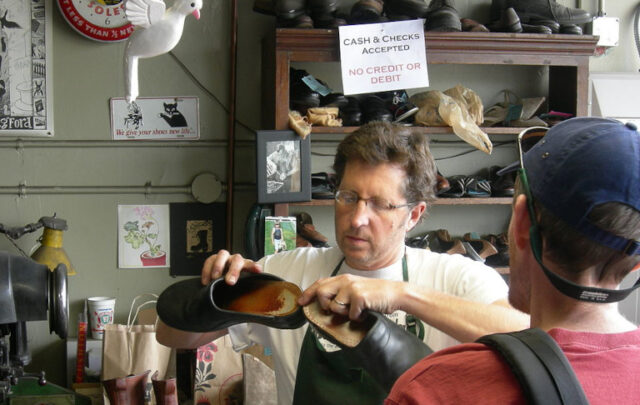 Don’t you love it when the same publication carries conflicting reports about the economy, posted on the very same day?
Don’t you love it when the same publication carries conflicting reports about the economy, posted on the very same day?
Thursday, CNN ran a piece celebrating the job count, claiming the economy is nearly back to pre-crash figures. Yet in a simultaneous article, more than half of Americans now agree that the American dream is out of reach.
Friday, the leading headline of the Los Angeles Times touted job figures. And in the same issue they carried an article decried the sharing economy for its darker side: desperation. That article calls the sharing economy “disaster capitalism.”
I love the phrase, because capitalism in its current form is truly a Disaster.
FATAL FLAWS
Capitalism has at its core several fatal flaws. One of these is concentration of wealth and another is the Growth presumption.
Capitalism is a system which rewards those who hold the capital, the wealth, the goods. If you own stuff, under this system you should get paid for that stuff by the people who need to use it. The system is an ongoing game of taking from the have-nots to give to the haves, “taking from the poorer to give to the rich.” At this point in America, many of the non-wealthy (the 99%) are being squeezed so completely that increasing numbers of people are no longer able to meet the most basic needs.
They can’t meet basic needs, let alone afford all the tantalizing consumer goods in front of us. And the entire system depends on us continually purchasing all those goods, in order for the system to keep on going.
In short, it is hitting the wall, it can’t keep going.
The Growth presumption – a foundation principle of today’s capitalism – says that “growth is good and lack of growth is failure.” This presumption is built into every layer of the system, from your salary to stock valuations to corporate profits to investments to interest. It is widely accepted as “normal” that all should be Growing. All the time.
Our insatiable hunger for Growth has driven capitalism to rape and pillage the planet, to the point that mankind as a whole currently consumes 1.5 times more resources each year than the planet makes or renews. (ecological footprint) North America in particular consumes to the point that – if everyone on the planet consumed the way we tell ourselves is “normal” – it would take FIVE planets to provide for it all. We cannot continue on this way.
Conventional capitalism is at the point of “game over.”
COPING
Progressive thinkers around the world have begun to ask the question “what comes next?” People like James Gustave Speth, former Dean at Yale, refer to “post-capitalism” in their work. There is not yet a conclusion as to what comes next, but the current system is certainly on the verge of, or in the process of, being replaced.
The term “transition” has change at its core. Transition admits change, it accepts change, it embraces change, even helps cultivate change. Changing our current economic system is a long, slow, evolving, decades-long process. We live in the midst of it, and will live out our lives within it. And in the midst of such massive shifts, we still must feed our kids and keep a roof over our family’s heads. Meanwhile, there are glimmers of the new path beginning to unfold.
We have one foot in the old, outgoing ways, and one foot in the new. “Economic uncertainty” is too mild a term. The schizophrenia of mainstream news’ business pages reveals the new normal: Sometimes the economy seems great, other times it sucks, and you never know quite what you’ll get. For want of a better term, I tend to use the phrase “the new economy” to describe this between-zone.
BUSINESS IN THE NEW ECONOMY
Running a business in the new economy is profoundly different. In some ways it might appear that there are some of the same outer trappings of the old ways – like, you still need business licenses and you are still subject to many of the same legal structures and tax laws. But at its core, business in the new economy is radically (= at its root level) different.
New-future businesses seek not only to help their owners put food on the table, but also to be a participant in making the world a better place. Terms like “social enterprise” are increasingly common. The new economy includes many industries which would seem ludicrous in the glory days of the now-dying system, new industries like urban agriculture and homestead businesses.
New-future businesses understand that the economic environment is radically different too. Resilience is important – lots of ability to flex and adapt amid continual change. All these businesses of the transition time are pinch-hitting in the gap between the old ways and the emerging new.
Some of the old rules for conducting business still apply, but many do not. Some of the old rules are outright detrimental to new future businesses. That’s why I started “Your Local Cup of Tea” – as a resource for small, sustainability-oriented businesses in the new economy.
UNDOING DISASTER
Can we “save” capitalism from its fatal flaws? I’m afraid not. But that doesn’t have to spell disaster, especially to those of us at the grass roots. You and your community can start putting survival tools in place. And – surprise, surprise – the sharing economy is one of that bundle of survival tools.
The L.A. Times article pounced on Uber car, yet Uber car is perhaps one of the most “capitalism-like” manifestations within the sharing economy. Much of the sharing economy looks very little like the old-style capitalism. Tool libraries, Little Free Libraries, skill sharing, backyard harvest sharing – a lot of sharing economy practices are cash-free. And the breadth of the sharing economy is only expanding.
Yes, L.A. Times, we are “celebrating a system that, at its core, is a reflection of our desperate times.” Yes, the flourishing of the sharing economy is evidence of the brokenness of the mainstream system. Yes, the sharing economy affirms that the old form of capitalism has failed. People are turning to other ways of facilitating economic transactions out of necessity.
But the sharing economy is also part of the glimmer of the emerging new. It has at its core many features that the old, dying system lacked. Features like getting to know your immediate neighbors, generosity, broad-based emotional satisfaction, creativity, localization, starting to reverse 5-planets-worth-of-consumption, a flourishing of the Commons, and – oh yes – fun! It is part of a broad portfolio of tools which are rebuilding and healing aspects of society which the old system has torn asunder.
Welcome to the new world.
You can view the glass as half empty and call it “disaster capitalism,” or you can view the glass as half full and welcome the birthing of the new economy.

Glass half full or empty image via fl4y/flickr. Creative Commons 2.0 license.






